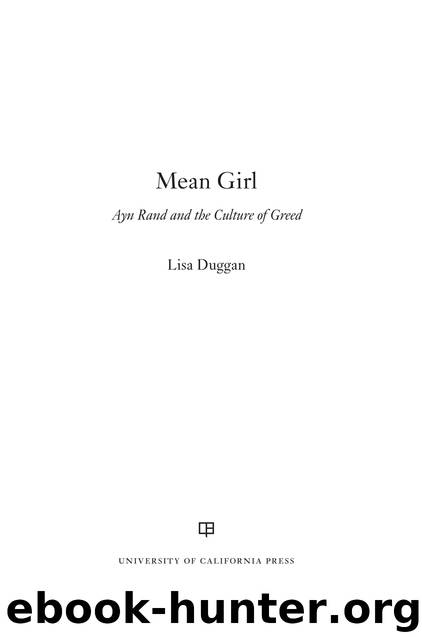Mean Girl: Ayn Rand and the Culture of Greed by Lisa Duggan

Author:Lisa Duggan [Duggan, Lisa]
Language: eng
Format: epub
Tags: History, Modern, 20th Century, Political Science, Political Ideologies, Capitalism, Literary Criticism, Subjects & Themes, Politics, political economy
ISBN: 9780520294776
Google: UQ6LDwAAQBAJ
Amazon: 0520294777
Publisher: Univ of California Press
Published: 2019-05-14T00:00:00+00:00
During the mid-1940s, the political atmosphere was shifting as the world war ended and the Cold War ramped up. Rand’s ideas moved from the margins toward the center of U.S. political life. Her novel fit into the new zeitgeist and continued doing very well, even if the movie version did not. But The Fountainhead took shape in earlier decades, during her life in Hollywood in the 1920s and ’30s. Seen as a kind of crude mirror of Rand’s view of Hollywood, translated from filmmaking to architecture, The Fountainhead presents the independent professional (Roark, Rand) at loggerheads with mediocre colleagues (“architecture by committee,” producers and directors), at the mercy of a large media corporation (the Banner, the studios), and under attack by collectivists (Toohey, the Reds of Hollywood). Gail Wynand’s tragic fate echoes Rand’s view of Cecil B. DeMille, the great director ruined by box office chasing.
Rand does provide a critique of capitalism in The Fountainhead, but it is a critique from the right. It is a critique of actually-existing capitalism as impure, as infested with Reds and on the collectivizing path to hell. She is a central figure in the development and spread of a political formation that historian Lee Grieveson calls “militant liberalism.” Grieveson traces this formation from 1919, in the wake of the Bolshevik revolution and World War I, through an intensification from the margins in opposition to progressive social democracy in the 1930s, to the Cold War. He then identifies militant liberalism as the core of neoliberal thinking in the 1970s and ’80s.31
In The Reactionary Mind, Corey Robin argues that the diverse and clashing threads of right-wing opinion cohere on two points: the defense of hierarchy and the attack on, and appropriation of, the strategies of the left.32 Rand’s writing fits this framework well. Her ideas and feelings emerged during the Bolshevik revolution, when her sense of outraged entitlement in the face of (to her) undeserved loss congealed into a moral economy and a structure of feeling that shaped her life’s work. Her impassioned defense of hierarchy, embedded in the history of racial capitalism and imperialism, combined with a eugenic sense of the greater value of physical beauty and capacity, infused her sense of superiority with moral righteousness. The resulting commitments shaped her lifelong advocacy of militant liberalism, or unregulated capitalism. To advance this advocacy, Rand repeatedly borrows ideas and language from the left. “Individuals of the World Unite!” may be contradictory, but it is typical of her constant appropriation of socialist strategies.
Rand wanted to borrow and counter socialist feelings as well as ideas. The aspirations and achievements of Ayn Rand’s heroes and heroines, combined with contempt and indifference for social inferiors, formed the structure of feeling she endlessly circulated for decades to come—optimistic cruelty, a practice as well as a feeling, set against the feeling of solidarity that runs through and nurtures the egalitarian social movements she so ferociously opposed.
Download
This site does not store any files on its server. We only index and link to content provided by other sites. Please contact the content providers to delete copyright contents if any and email us, we'll remove relevant links or contents immediately.
4 3 2 1: A Novel by Paul Auster(12393)
The handmaid's tale by Margaret Atwood(7764)
Giovanni's Room by James Baldwin(7346)
Asking the Right Questions: A Guide to Critical Thinking by M. Neil Browne & Stuart M. Keeley(5775)
Big Magic: Creative Living Beyond Fear by Elizabeth Gilbert(5772)
Ego Is the Enemy by Ryan Holiday(5450)
The Body: A Guide for Occupants by Bill Bryson(5097)
On Writing A Memoir of the Craft by Stephen King(4944)
Ken Follett - World without end by Ken Follett(4732)
Adulting by Kelly Williams Brown(4574)
Bluets by Maggie Nelson(4556)
Eat That Frog! by Brian Tracy(4540)
Guilty Pleasures by Laurell K Hamilton(4449)
The Poetry of Pablo Neruda by Pablo Neruda(4109)
Alive: The Story of the Andes Survivors by Piers Paul Read(4033)
White Noise - A Novel by Don DeLillo(4010)
Fingerprints of the Gods by Graham Hancock(4004)
The Book of Joy by Dalai Lama(3986)
The Bookshop by Penelope Fitzgerald(3853)
